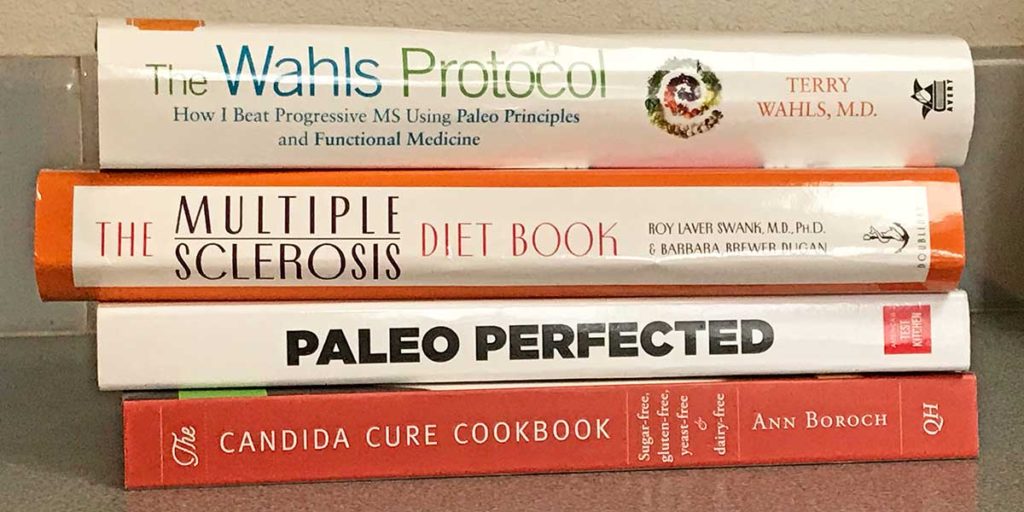
There are many diets for multiple sclerosis (MS) but not one is perfect. Everyone is different and everyone reacts to food differently. The important thing is to explore the power of an anti-inflammatory diet in managing MS symptoms. Learn how simple dietary changes can make a significant impact on your well-being and overall health.
Choosing disease-preventing foods over disease-promoting ones will improve your health. Aim for eating mostly fruits and vegetables. They include antioxidants, fiber, phytonutrients, vitamins, and minerals. Plus, they are antibacterial, antifungal, and antiviral which fight off pathogens.
Autoimmune diseases like MS are increasing and it’s because of our lifestyle. Environmental exposures, such as pollutants, diet, viral infections, and stress, are linked to autoimmunity.
The Standard American Diet

Image by stockking on Freepik
The Standard American Diet (SAD) is high in cholesterol, fat, protein, sugar, and salt. People eat highly processed foods that promote disease. Chronic diseases in the U.S. are epidemic and often preventable with diet and exercise.
The SAD is missing healthy, anti-inflammatory foods. Healing foods include fiber, healthy fats, nutrients, phytonutrients, vitamins, and minerals. Chronic inflammation leads to metabolic diseases. Having one disease increases the risk of a second. A lifestyle with veggies, fruits, healthy fats, and herbs can control inflammation.
Anti-inflammatory Diet

Studies found MS is a chronic inflammatory disease. Some foods such as heavily processed foods and sugary drinks create inflammation. Other foods such as fruits and vegetables reduce inflammation. An anti-inflammatory diet is a way of eating that reduces inflammation in the body.
The principles of an anti-inflammatory diet typically include:
- Whole Foods. Emphasizing whole, unprocessed foods such as fruits, vegetables, lean proteins, and healthy fats.
- Fruits and Vegetables. These are rich in antioxidants, vitamins, and minerals that can help combat inflammation.
- Healthy Fats. Include healthy fats from sources like fish (salmon, mackerel), flaxseeds, and walnuts. Olive oil is another source of healthy fats.
- Healthy Proteins. Choose healthy protein like wild-caught fish, pasture-raised poultry, and grass-fed and finished meats.
- Nuts and Seeds. Include a variety of nuts and seeds like almonds, walnuts, chia seeds, and flaxseeds.
- Herbs and Spices. Herbs and spices like turmeric, ginger, garlic, and cinnamon have anti-inflammatory properties.
- Avoid Processed Foods. Avoid processed and sugary foods, as they can contribute to inflammation.
- Avoid Dairy. Studies found dairy increases flares in people with MS.
Chronic Inflammation

Image by wirestock on Freepik
Chronic inflammation can persist for weeks, months, or years. Inflammation is a natural and necessary part of the body’s immune response. Acute inflammation helps heal injuries and fight off foreign invaders. Once the threat is gone the body goes back to its prior self. Acute inflammation is good and helps the body heal.
“MS is a chronic inflammatory disease characterized by central nervous system (CNS) lesions that can lead to severe physical or cognitive disability as well as neurological defects.” – PubMed
Chronic inflammation is a different story. It is a contributing factor to many diseases, including heart disease, some cancers, and MS. Acute inflammation is a normal response to injury or infection. However, chronic inflammation can be harmful in the long term.
An anti-inflammatory diet, toxin removal, and a healthy lifestyle can halt MS progression. Along with many other diseases like cardiovascular disease, cancer, and type 2 diabetes. Fruits, vegetables, herbs, and spices are healing.
“Multiple sclerosis incidence and disease course are clearly influenced by environmental factors.” – PubMed
What causes chronic inflammation?

Image by Freepik
Many factors can trigger chronic inflammation. Often stemming from lifestyle choices and environmental influences. Poor dietary habits, like excess processed foods and sugar, contribute to chronic inflammation. Lack of regular exercise, ongoing stress, smoking, and excessive alcohol worsen it.
Autoimmune disorders and chronic infections contribute to prolonged inflammation. Some individuals may be genetically predisposed to increased susceptibility to chronic inflammatory responses.
To learn more about genetics read: Do Genetics Play A Role In MS?
Many things can cause chronic inflammation including:
- Industrial chemicals such as pesticides, household cleaners, or polluted air
- Infectious organisms such as mold and parasites
- Untreated cases of acute inflammation, such as an infection or injury
- Chronic stress
The World Health Organization (WHO) ranks chronic diseases as the “greatest threat to human health.”
The same unsustainable choices that are killing our planet are killing people.
Dr Tedros Adhanom Ghebreyesus, WHO Director-General
Risk factors leading to chronic inflammation:
- Diet
- Hormone imbalance (cortisol, insulin, sex hormones, vitamin D, etc.)
- Lack of exercise
- Obesity
- Sleep disorders
- Smoking
- Stress, both physical and emotional stress
Fortunately, you can reverse chronic inflammation through simple dietary and lifestyle changes. Eating a whole, healthy diet is not a new concept for people with MS. Researchers studied the association between diet and MS many decades ago.
Diet is the single most significant risk factor for disability and premature death.
PubMed
Diets for MS

In the 1940s, Dr. Roy Swank began researching the connection between MS and diet. He found coastal regions of Norway had fewer cases of MS than inland areas. The difference between the two was how they ate. People who lived in coastal areas tended to eat more fish. At the same time, people who lived inland ate more meat with saturated fats.
Roger MacDougall, diagnosed with MS in 1953, was a Scottish playwright. Within a few years, he was unable to use his eyes, fingers, and legs, it even affected his voice. By eating a hunter-gatherer diet he was able to reverse his MS and run up and downstairs again.
Dr. Terry Wahls went from being in a tilt recline wheelchair to riding her bicycle. Now, she helps others with her diet The Wahls Protocol.
Many people overcame MS by eating and living a healthy lifestyle, here are a few:
- Ann Boroch, author of Healing Multiple Sclerosis
- Mathew Embry, filmmaker and advocate for MS – watch his documentary Living Proof on Amazon
- Palmer Kippola, author of Beat Autoimmune
- Pam Bartha, author of Become a Wellness Champion
Some people disagree a healthy diet can stop the progression of MS. Don’t let them convince you of this. An anti-inflammatory diet along with a healthy lifestyle has many health benefits.
Higher quality diet was associated with a 30% less likelihood of higher disability level (talking about MS patients).
PubMed
There’s a lack of large-scale studies confirming a healthy diet’s benefits for MS. However, increasing evidence suggests environmental factors play a key role in MS.
Live a Healthy Lifestyle

Image by senivpetro on Freepik
Besides diet, you need to promote overall wellness by listening to your body. The human body is amazing at healing itself and it will send you signals when something isn’t right. You need to become a detective and figure out what works best for you.
“Gluten-Free,” “Natural,” or “Organic” on the food packages does not mean the food is healthy. Always read the ingredient label so you know what you’re getting.
- Eat an anti-inflammatory diet that is plant-based or mostly plant-based
- Remove foods that cause inflammation (processed foods, refined carbohydrates, and refined sugar)
- Provide nutritional support for the body’s detoxification systems such as your liver
No matter which diet you choose, work on lowering your inflammation. Plus, drink plenty of water, exercise, get a good night’s sleep, and lower your stress. Stress plays a major role so it’s very important to stay calm and relaxed.
To help lower stress read How To Use Mindfulness To Reduce Stress
Take charge of your health journey today by eating an anti-inflammatory diet to help manage MS and unlock a brighter, healthier future.

The Ultimate Guide to Surviving & Thriving with MS
Unlock the key to a vibrant life with multiple sclerosis by subscribing to my newsletter and gaining exclusive access to ‘The Ultimate Guide to Surviving & Thriving with MS.’ It’s packed with valuable information on natural management strategies and clean health lifestyle practices that you can start today.
Want to remember this health tip? Pin it to your Pinterest board!

Image by wayhomestudio on Freepik
Conquering MS with an Anti-Inflammatory Diet





